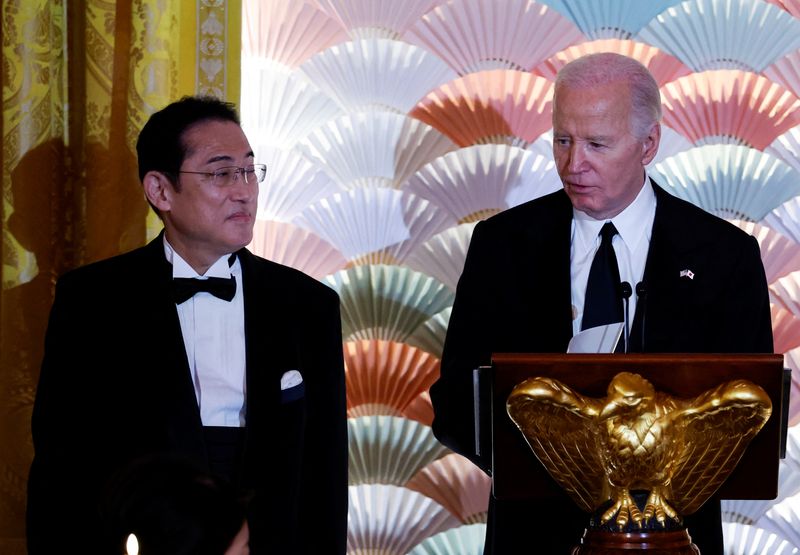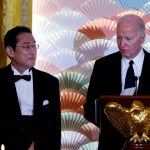WASHINGTON (Reuters) – Long-simmering tensions between China and its neighbors will be in the spotlight on Thursday as leaders of the U.S., Japan and the Philippines gather at the White House to push back on Beijing’s stepped-up pressure on Manila in the disputed South China Sea.
U.S. President Joe Biden will announce new joint military efforts and infrastructure spending in the former American colony as he hosts Philippines President Ferdinand Marcos Jr. and Japanese Prime Minister Fumio Kishida in Washington for a first-of-its-kind trilateral summit.
Topping the meeting’s agenda is China’s increasing pressure in the South China Sea, which has escalated despite a personal appeal by Biden to Chinese President Xi Jinping last year.
The Philippines and China had several maritime run-ins last month that included the use of water cannon and heated verbal exchanges. The disputes center on the Second Thomas Shoal, home to a small number of Filipino troops stationed on a warship that Manila grounded there in 1999 to reinforce its sovereignty claims.
Biden will affirm that a 1950s era mutual defense treaty binding Washington and Manila would require the United States to respond to an armed attack on the Philippines in the Second Thomas Shoal, one of the U.S. officials said.
Marcos has successfully pushed Washington to resolve longstanding ambiguity over the treaty by specifying that it would apply to disputes in that sea.
“What you’ll see is a clear demonstration of support and resolve from both President Biden and Prime Minister Kishida that we stand shoulder to shoulder with Marcos, ready to support and work with the Philippines at every turn,” the official said.
China claims almost the entire South China Sea, including the maritime economic zones of neighboring nations. The Second Thomas Shoal, is within the Philippines’ 200-mile (320-km) exclusive economic zone. A 2016 ruling by the Permanent Court of Arbitration found that China’s sweeping claims have no legal basis.
Japan has a dispute with China over islands in the East China Sea.
“China’s frequent tactic is to try to isolate the target of its pressure campaigns, but the April 11 trilateral signals clearly that the Philippines is not alone,” said Daniel Russel, who served as the top U.S. diplomat for East Asia under former President Barack Obama.
The U.S. plans a Coast Guard joint patrol in the Indo-Pacific region in the coming year as well as joint maritime training activities. Washington will also place “humanitarian relief commodities for Philippine civilian disaster response” at Philippine military bases, an official said.
More joint patrols in the coming months can be expected in the South China Sea after drills by the United States, Australia, the Philippines and Japan last weekend, another U.S. official said.
The moves come after two prominent U.S. senators on Wednesday introduced a bipartisan bill to provide Manila with $2.5 billion to boost its defenses against Chinese pressure.
The leaders will also discuss broader regional challenges and economic development, with new investments coming in undersea cables, logistics, clean energy and telecommunications. Facebook (NASDAQ:META) parent Meta and UPS are among the companies announcing deals related to the visit.

A new air missile defense network announced on Wednesday involving Japan and Australia and focused on the Indo-Pacific region is still “probably a few years off,” one of the officials said.
Biden’s Partnership for Global Infrastructure and Investment will back a new Luzon corridor effort in the Philippines, aimed at infrastructure projects including ports, rail, clean energy and semiconductor supply chains.
To read the full article, Click Here

